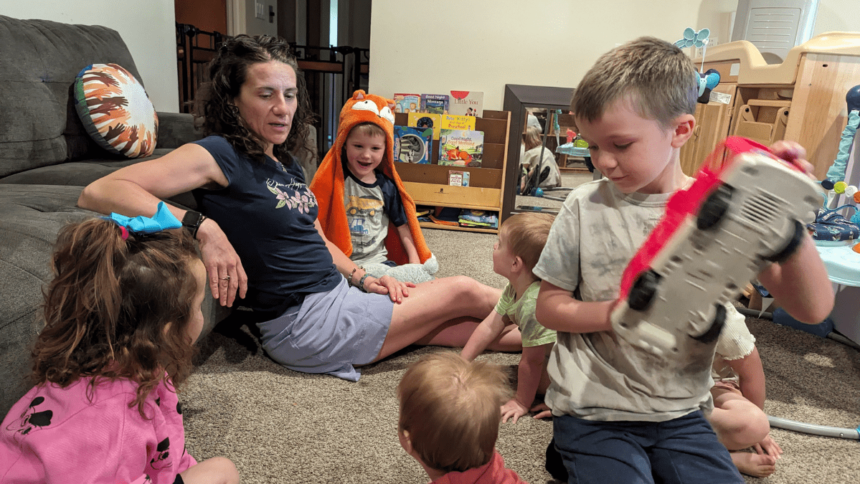Montana Free Press recently investigated the challenges facing working families and childcare providers in Montana, in collaboration with the national news nonprofit Open Campus. The following portrait provides a deeper view into the experience of one of the sources crucial to that reporting, offering readers another lens through which to understand how childcare issues are impacting everyday Montanans.
On a Wednesday afternoon this spring, Sara Low watched her two children play in the fenced backyard of the Wild Wonders Early Learning Program, a home-based Missoula childcare outfit owned and operated by BriAnne Moline. Several of the program’s half-dozen kids hovered beside a raised flowerbed, hands reaching into the dirt. A few more raced back and forth across the grass between Moline’s back patio and a large plastic playground set.
Low is a member of a community of families in the Missoula area who have come to see Moline as more than a childcare provider. Parents in the Wild Wonders orbit have befriended one another, gotten their kids together outside the program, and extended invitations to birthday parties and sporting events to Moline. The modest Wild Wonders home, far out on Mullan Road, has become the center of a small social universe, one that’s given Low access to a critical childcare resource even beyond Moline’s normal working hours.
“She’s my lifeline,” Low said.
Fulfilling that role hasn’t been easy for Moline. As MTFP previously reported, she had to relocate twice in 2018 after landlords proved reluctant to rent to a licensed childcare business. She’s cut costs in efforts to support her own family and keep the rates she charges manageable for clients, to the point that she now runs Wild Wonders alone. Through it all she’s remained an outspoken advocate for her industry, lobbying the Montana Legislature for reforms and working with a number of statewide and national initiatives to make childcare more affordable.
RELATED
Montana’s stubborn childcare conundrum
Barriers to childcare kept an estimated 66,000 Montanans from fully engaging in the workforce in 2023, training a local lens on a national crisis that families, providers, and higher education programs are struggling to navigate. Over the past three months, MTFP collaborated with Open Campus, a higher education news outlet that works in partnership with local newsrooms, to explore those challenges through the lives of everyday Montanans trying to make it work.
“I’ve been a single mom. I am a single mom. I know what it’s like to want to put your child in quality care and not be able to afford it,” Moline said.
It’s a recognition that resonates with families across Montana, where the average annual cost of childcare last year was nearly $19,000 — a figure equivalent to 28% of the median household income in the state, according to Montana Department of Public Health and Human Services estimates.
Low’s challenges echo those that have motivated Moline, and she doesn’t hesitate to share the lengths she’s gone to to balance parenthood and employment. Low works four days a week in shipping and receiving, commuting more than 10 miles from her home in Potomac to drop off her kids at Wild Wonders before doubling back into Missoula. She said she earns roughly $2,000 a month, nearly half of which goes to childcare. She recently had a line on a job with higher pay and better benefits, but the work hours extended to 7 p.m. Since most childcare outfits, including Moline’s, end at 5 p.m., Low said she’ll likely have to pass on the opportunity.
“You either basically don’t be a parent and basically tell your kids they don’t matter by not being a parent, or you put your kids first and be the parent so they know that you’re there for them and you’re supporting them,” Low said. “And for me, I’m going to be the parent that’s going to be there and support them.”
“I’ve been a single mom. I am a single mom. I know what it’s like to want to put your child in quality care and not be able to afford it.”
Wild Wonders Early Learning Program proprietor BriAnne Moline
As Low rounded up her kids, fellow Wild Wonders parent Peter Damrow lingered in the grass nearby ready to pick up his own. Damrow moved from Billings to Frenchtown with his wife and their two children in January and quickly started exploring local childcare options. He said they briefly considered hiring a private nanny, as they’d done in Billings and could likely afford to do again, since they make a comfortable living as attorneys. But conscious of their new mortgage and the high cost of such care, they opted to tour group programs in the area first, and were immediately drawn to Moline’s operation.
Since then, Damrow said, Wild Wonders has become a central part of their lives. The program has plugged them into a social network complete with birthday party invitations, which is no small thing given the Damrows’ recent relocation to the area and the fully remote status of their jobs. Moline even helped Damrow and his wife facilitate a night out together without the kids — their first, he added, “in a long time.”
“I know it’s kind of sad we have to meet people through daycare and everything, but it’s just kind of natural,” Damrow said. “We’re all here running into each other, making friends with the other parents, and Bri too.”





